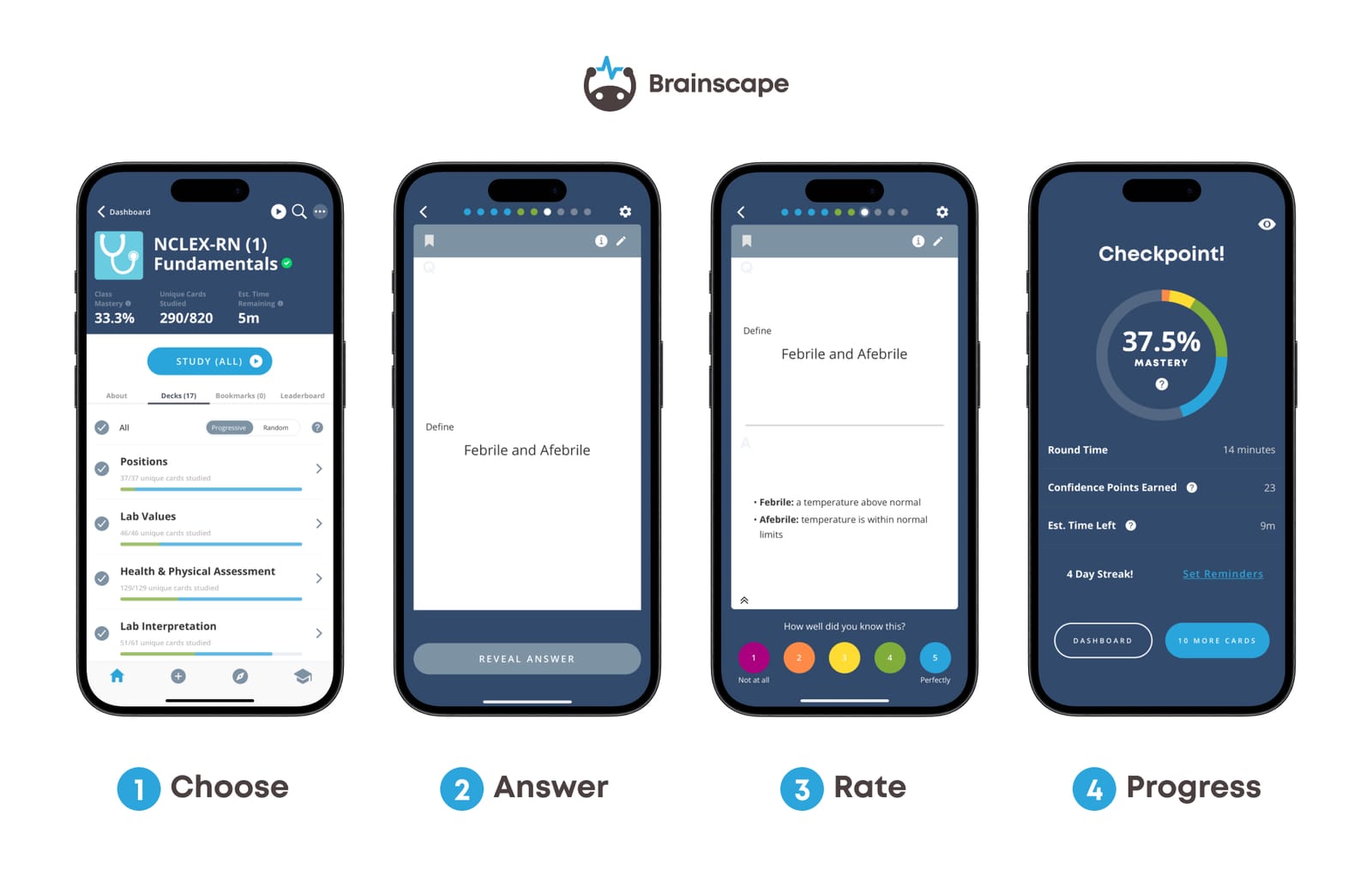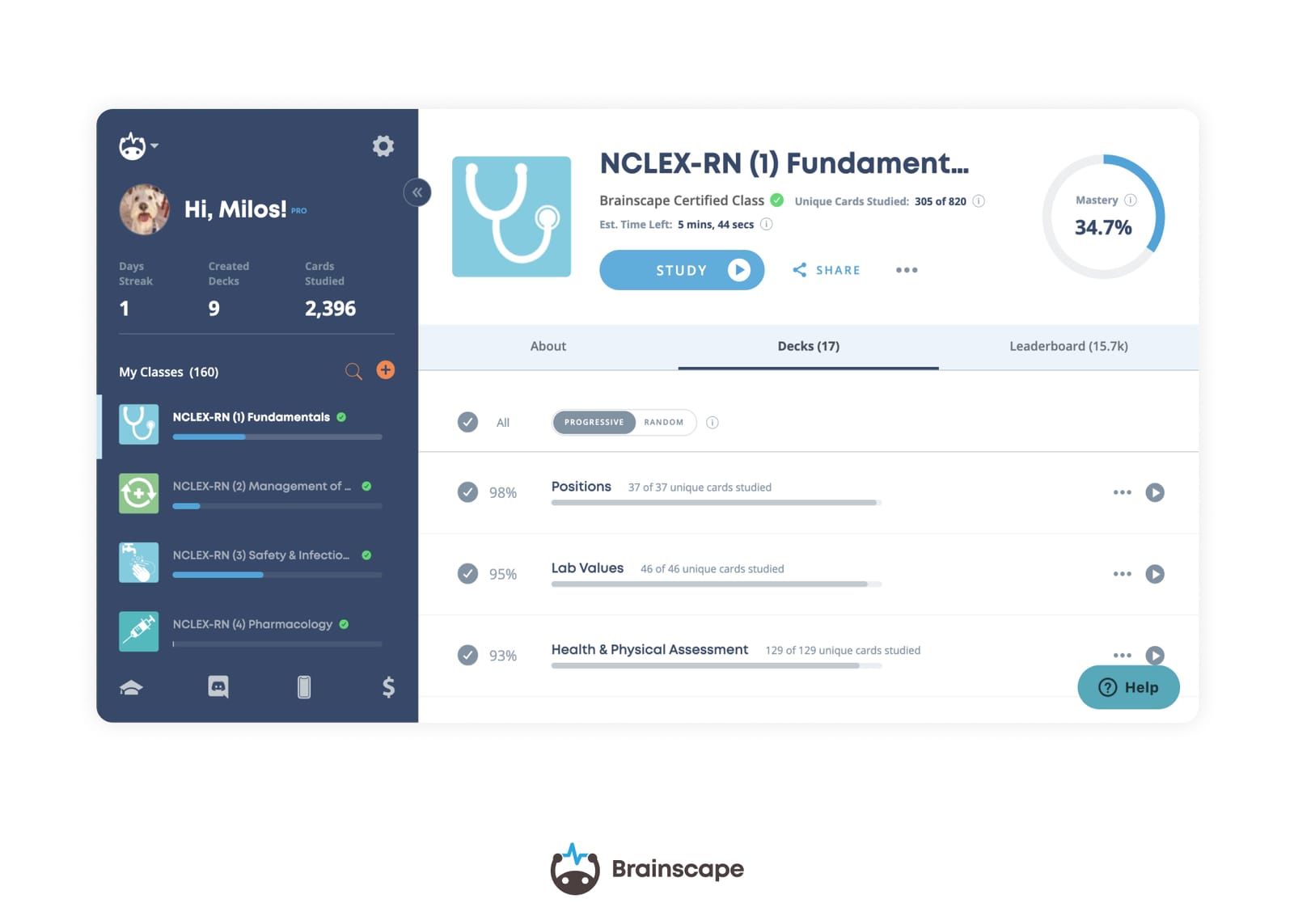Mistakes are a natural part of life but when it comes to studying for the biggest exam of your life thus far, you can really do WITHOUT the drama, thanks. So … to help you emerge safely on the other end of the learning curve, our partner and esteemed NCLEX tutor, Justine Buick (www.TheNclexTutor.com) put together this list of common NCLEX mistakes that many nurse grads make. We then follow up each mistake with the best advice on how to course-correct, helping you to study smarter and pass your exam the first time!
Common NCLEX Mistake: Doing Hundreds Of Practice Questions Every Day!
All too often, the resounding NCLEX advice out there is to do as many practice questions as is humanly possible: hundreds of ‘em every day! But there comes a point where you stop processing each practice question the way you should, which grinds all learning to a halt.
The whole point of practicing NCLEX questions is to flex your content knowledge, reinforce what you’ve learned, and hone your critical thinking and reasoning skills. And you’re not doing any of that if you don’t study your performance for each and every question, understanding:
- Why you got an answer right or wrong
- Why the correct selection/s were the best possible answer/s, or
- Why the incorrect selection/s were not the best possible answer/s
Over and above all of this is the fact that good practice questions aren’t easy (or cheap) to come by. So if you’re answering hundreds a day, you’re probably consuming all manner of practice questions—both good and bad—which won’t prepare you properly for the NCLEX. (And there are better ways to spend this time: like studying the BACKGROUND knowledge that would have helped you answer those questions in the first place!)
NCLEX RN advice to course correct
Our recommendation is to do between 25 and 100 NCLEX-style questions a day, depending on the time you have available. Importantly, after you’ve answered the questions, make sure you understand WHY you got the answers correct/incorrect and, also, why the other answer options were correct/incorrect. You need to practice identifying relevant details and prioritizing actions. This is where the real learning happens!
Pro tip: Make flashcards for the new concepts you come across or struggle with, and then use a digital flashcard app like Brainscape or Anki to drill you on those facts so that you don’t get them wrong ever again.
Common NCLEX Mistake: Not Using Your Clinical, Real-Life Experience To Answer Questions

The mistake here is relying SOLELY upon NCLEX theory (what you’ve learned from your textbook and prep program) to answer exam questions. And while this guidance is well-intentioned, the NCLEX fundamentally tests you on your knowledge as a nurse, your adherence to safety protool, and your critical thinking skills. The latter is honed through practical experience, so you will and you should lean on your clinical real-life experience when approaching NCLEX questions.
Having said that ...
NCLEX RN Advice To Course Correct
Use caution when you do because there are many instances “in real life” where shortcuts are taken, or the strictly correct protocol is not followed, or the patient case IS extremely unusual. Remember, the NCLEX will always test you on what TYPICALLY happens in 99% of all cases or situations: not in some extremely unusual scenario.
Otherwise, yes, use your clinical experience when it comes to labs, signs and symptoms, understanding what meds are for, and most interventions you did for the patient! You have a wealth of knowledge and experience, so it’s worth using it as a resource.
Common NCLEX Mistake: Retesting Too Soon (In 45 Days)
For candidates who fail the NCLEX, the compulsion can be to retest as soon as possible so that they can get through it, get past it, and forget it ever happened. The problem with this approach is that it doesn’t leave any space for learning where you went wrong so that you can do better the next time around. And if there’s one thing worse than failing the NCLEX, it’s failing it again.
NCLEX RN Advice To Course Correct
Retest when you are ready. Give yourself a few days or even a week to get over the fact that you failed (it is a massive blow, after all). After that, you’ll need to take time to assess where you went wrong and what you struggled with the most.
Then, draw up a new study plan that gives you the time you need to bring your content knowledge up to par and polish your critical thinking skills through plenty of practice questions. All of this typically takes longer than 45 days.
Our advice is to give yourself a solid 8 weeks (or two months) before you retake the NCLEX.
Common NCLEX Mistake: Favoring Critical Thinking Over Content Knowledge
Nope! There is absolutely NO WAY you can pass the NCLEX without having strong content knowledge. You unavoidably have to memorize reams and reams of information about anatomy, symptoms, diseases, medications, side effects, safety protocol, and more.
NCLEX RN Advice To Course Correct
Yes, the NCLEX absolutely tests critical thinking skills but it ALSO tests content knowledge in equal measure. So a good study strategy makes time for both critical thinking skills and content learning and memorization. And THIS is where Brainscape makes a dramatic stage entrance with some much-needed “secret sauce” to success.
Why Flashcards Are The Best Study Tool For The NCLEX RN

Preparing for the NCLEX isn’t just about learning to think like a nurse. It’s about knowing an enormous amount of factual information cold. You’ll need to remember drug classes, side effects, lab values, safety protocols, infection control measures, prioritization frameworks, and more. That’s where digital flashcards come in. They help you memorize and retain critical information efficiently by engaging three cognitive science-backed learning techniques:
Active recall: Flashcards require you to retrieve an answer from memory rather than recognize it from a list of options or reread it in your notes. That mental workout strengthens recall speed and accuracy, both of which are essential for answering NCLEX questions under time pressure (and for reacting quickly on the floor).
Spaced repetition: Human memory fades fast unless you revisit material regularly. Flashcards work best when you review them at spaced intervals, which strengthens your long-term retention. Digital flashcard apps such as Quizlet or Brainscape automate this process by resurfacing tough topics more often while letting easier ones fade into the background. This locks information into your long-term memory and increases your learning speed.
Metacognition: After each flashcard, you reflect on how well you knew the answer. This self-awareness helps you identify gaps in your knowledge and study more strategically. The more you evaluate your confidence, the more efficiently you’ll use your study time, focusing on weak areas instead of spinning your wheels on what already feels familiar.

Another huge advantage of flashcards is their flexibility. You can squeeze in short study sessions anywhere: during lunch breaks, while commuting, or between clinical shifts. Even a few minutes a day adds up to major progress over time.
In short, digital flashcards are one of the smartest tools you can use to prepare for the NCLEX RN. They don’t replace practice questions or clinical reasoning exercises, but they make your foundation of knowledge rock-solid, giving you the confidence and recall you’ll need to ace the exam and step confidently into your nursing career.
Common NCLEX Mistake: Cramming In 12-Hour Study Days The Week Before The NCLEX
12 Hours is a lot. And while there will be days you’re capable of putting in a massive study session, this approach simply isn’t sustainable, NOR is it an efficient way to go about studying for the NCLEX. Besides, your brain is only capable of absorbing a finite amount of new information in a single sitting. After that point, it just forgets, and you’ll be wasting the time you could be spending in a more productive (and healthier) manner, like getting some exercise, which is proven to improve learning!
NCLEX RN Advice To Course Correct
Without a doubt, the best approach to studying for the NCLEX is to start several months before your exam and to devote time every day to memorizing (and constantly reviewing) the important content and practicing questions. In other words, it’s better and a whole lot less stressful to put in six-hour study days over several months than it is to attempt a marathon study session (i.e. to cram) a week before the exam.
(Use Brainscape's totally free NCLEX study planners and exam countdown sheets to plot out your studies and keep you on track to crush your study goals!)
Also, mix up your study modes and media, spending a portion of that time on older content review, new content memorization review, and question practice. This way, you won’t burn out and you won’t forget content you’ve already covered.
Final NCLEX RN Advice

We’ve covered some of the biggest mistakes nurse grads make as they prepare to take the NCLEX. And if you recognize any in your own prep, we sincerely hope we’ve given you the right advice and tools you need to adjust your approach and do much better.
If you’re feeling anxious—as so many students do in the lead-up to this major exam—just remember that with the right study habits, routine practice, and digital flashcards, you’ve totally got what it takes to crush the NCLEX!
**NCLEX-RN® is a registered trademark of the National Council of State Boards of Nursing (NCSBN), which neither sponsors nor endorses this product.
Additional Reading
- How to study medications for the NCLEX
- The best way to use NCLEX practice questions
- Does it matter which nursing school you attend?
References
Exercise can boost your memory and thinking skills. Harvard Health. (2024, August 26). https://www.health.harvard.edu/mind-and-mood/exercise-can-boost-your-memory-and-thinking-skills
Karpicke, J. D. (2012). Retrieval-based learning: Active retrieval promotes meaningful learning. Current Directions in Psychological Science, 21(3), 157-163.
Lally, P., & Gardner, B. (2013). Promoting habit formation. Health Psychology Review, 7(sup1), S137-S158.
Sadler, P., & Good, E. (2006). The impact of self- and peer-grading on student learning. Educational Assessment, 11(1), 1–31. https://doi.org/10.1207/s15326977ea1101_1
The NCLEX Tutor. (2025, March 20). https://thenclextutor.com/
Top NCLEX practice questions you should study. Nurse.org. (n.d.-b). https://nurse.org/education/nclex-practice-questions/
